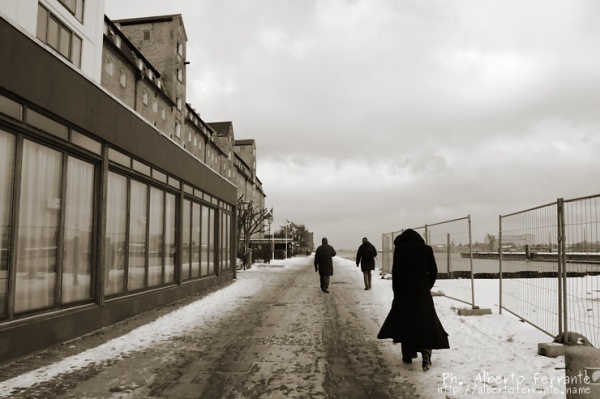
Walking Away In the Cold (picture used by permission)
On May 8th, my friend Jack King delivered a sermon about the disciples on the road to Emmaus. He talked about how they are walking away from Jerusalem. That powerful image stuck in my mind, so I tried to write a meditation in responde to Jack’s sermon.
They’re walking away.
Walking toward Emmaus, they leave Jerusalem behind.
Three days ago they still burned with hope that Messiah had come. They still believed the Kingdom of God was at hand. They still believed the glory of God’s people would soon be restored; the oppressive rule of Rome was coming to an end; the false king Herod would soon be deposed. They believed Jesus would restore the land, the Temple, and the people. God’s kingdom was breaking into their midst, and they were filled with joy and hope and anticipation.
Today they’re walking away.
Jesus died on the cross as a lowly criminal. His bold proclamations died with him. Their faith died as well.
Walking toward Emmaus, they leave behind faith and hope and love. They leave behind dreams that rotted on the vine. They leave behind promises that hang empty in the air. They leave behind a community of disciples that now lies in ruin. They leave behind everything that gave their life meaning.
Today they’re walking away.
An ache grips their throat choking down through to the bowels. It feels as though they’ve eaten a poison that kills from the inside out. They cough out dead words of dead dreams. They look through dead eyes at a dead world. What do you do when all hope is lost?
Walking toward Emmaus, they leave behind the future and search blindly for a past that is gone. Once you’ve tasted something so wonderful, so beautiful, so hopeful, where do you go when it dies? You can’t go back to what you knew before. So you’re stuck in between a dead past and hope less future.
Today they’re walking away.
They walk and move and breathe in the numbing emptiness of limbo.
Some of us know the road to Emmaus all to well. We’ve known the excitement of God’s people hoping and believing and experiencing His touch, but we’ve also known the loss of hope, the death of dreams, the sense that God left us, forgot us and possibly even abandoned us. Some of us are walking alongside these disheartened disciples as they leave the Holy City.
Walking toward Emmaus, the Risen Jesus joins his disciples in their unsightly death march. His disciples have lost hope, lost faith, lost vision. They’re leaving Jerusalem. They’re walking away. And Jesus is walking with them.
Even when his disciples are faithless, He is faithful. He walks beside. He hears their complaint. His listens to their groans. He even asks them questions.
In the fullness of time, He speaks. He rehearses the story of God in the midst of His people. He reveals the goodness of God in the midst of dead lives, dead dreams, dead people. Again and again and again, the Lord speaks His Word to His people in distress, in blindness, in darkness. Again and again and again, His Spirit quickens faith in their hearts.
Noah hears this Word amidst his blind and deaf world and builds an ark that will be the beginning of a new world. Moses hears the Word while wondering among the Midianites. Samuel hears this Word when Israel’s light is flickering and about to go out. David hears the Word in the tomb of the cave. Ezekiel hears the Word on the banks of the River Chebar in Babylon.
Again and again and again, the Word resurrects the dry and dead bones of God’s people. Many times, God’s people are not seeking, are not looking for Him, and are not even aware of Him. Their hope and faith have long since died. The Word of Life overcomes the darkness and quickens the dead to life.
Today Jesus is walking away.
He walks away from the Holy City to join his weary disciples in their flight from God’s work. He speaks. The ache of death fades as faith sparks afresh. Anticipation burns within. Suddenly, they can see. The Risen Lord stands among them, serving them, feeding them, sustaining them.
Walking toward Emmaus, we’re leaving behind the grand expectations we had for God. Stripped of our confidences, our conditions, our conclusions, we encounter the Risen One. He is walking with us. He is listening to our complaint. He knows our frustration and confusion.
At the outskirts of Jerusalem, we hear His strange and wondrous Word of God. And who knows? As we follow the Voice of this Holy Shepherd, we may end up walking along side those who left the Holy Spirit and are waiting in darkness for the Word of Life.
 Here are a few thoughts in memory of my dad.
Here are a few thoughts in memory of my dad.
